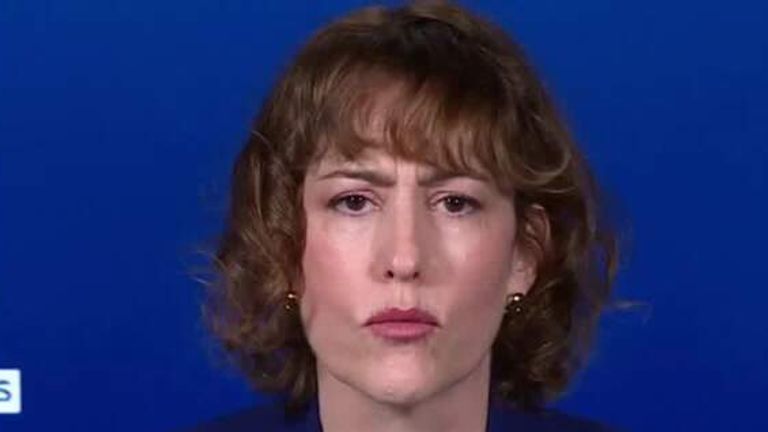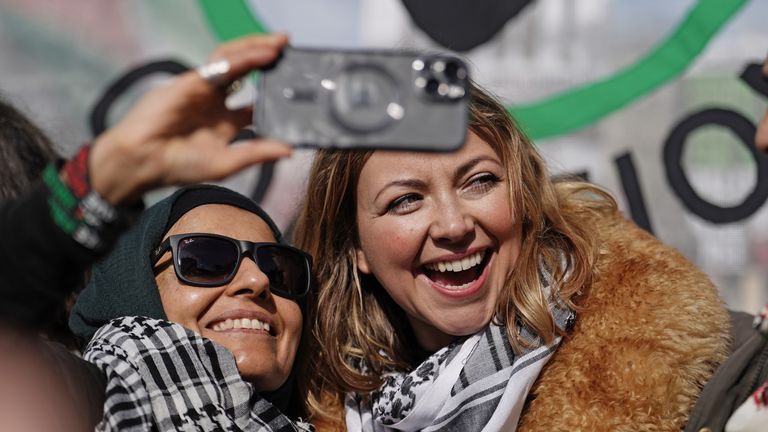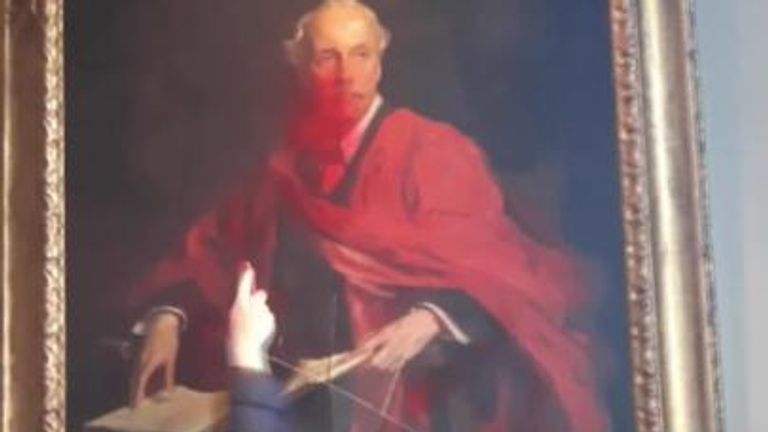Minister fails to name which groups or individuals will fall under new definition of extremism
Victoria Atkins spoke to Sky News after Michael Gove urged pro-Palestinian protesters to question whether extremist groups were behind some demonstrations.
Sunday 10 March 2024 15:03, UK
A cabinet minister has failed to name which groups or individuals would fall under the upcoming revised definition of extremist groups.
Health Secretary Victoria Atkins was interviewed on Sky News' Sunday Morning With Trevor Phillips after her frontbench colleague Michael Gove urged pro-Palestinian protesters to question whether extremist groups are behind some demonstrations.
She said the communities secretary was "setting out his ideas as to what we should do to tackle some of these very extreme views that we are sadly seeing expressed around our streets".
Politics Live: Scrapping non-dom status 'an utter humiliation' for Tories, says Reeves
Tens of thousands of people took part in a protest against Israel's war in Gaza organised by the Palestine Solidarity Campaign (PSC) in London on Saturday - the fifth march in the capital this year. Five were arrested and a counter-demonstrator de-arrested.
The upcoming revised definition of extremist groups would receive "more specificity" and enable the government and other public bodies to ban funding and engagement with Islamist and far-right groups, Mr Gove told the Sunday Telegraph.
Asked by Trevor Phillips about whether this meant there would be additions to the list this week, Ms Atkins said Mr Gove's comments were a continuation of the warnings about extremism that Rishi Sunak gave in his Downing Street address last week, "namely that there are some people, sadly, who hold views that are contrary to the values that we hold as a country".
"We should not allow those views to percolate through society or indeed allow them to try to change the way we as a society conduct our democracy, the way we allow parliament to set its own rules and conventions," she said.
Ms Atkins did not name which groups or individuals might fall under the new definition, but pointed to pro-Palestine activists spray-painting and slashing a portrait of Lord Balfour at the University of Cambridge's Trinity College on Friday, adding "this is not the way we conduct democracy and express our views in this country".
👉 Listen above then tap here to follow Electoral Dysfunction wherever you get your podcasts 👈
Jewish residents 'worried about walking in London' during demonstrations
Pressed on whether the government was planning to ban groups because of the views they hold, Ms Atkins said there was a "longstanding convention" in the UK of "proscription for those groups that meet the very strict criteria under the legislation," which she described as "the most extreme end".
But she said "at the other end of the scale" there was concern that in large-scale pro-Palestinian demonstrations "there can be a minority of people who hold and extol views that make the rest of us feel not just deeply uncomfortable, but if you are a Jewish resident of London, some have said they feel worried about walking in London when these demonstrations happen, and that's not right".
Read more:
Hate preachers to be blocked from entering the UK
Ministers urge government to increase defence spending in highly unusual intervention
New definition is not attempt to draw dividing line with Labour
The health secretary insisted the new definition was not a political attempt to draw a dividing line with Labour.
She said: "It is precisely because we have seen, sadly, in the last six months or so, this rise in extremist ideas which is making people - other citizens in our country - feel deeply uncomfortable.
"So, it is that balancing act between... freedom of speech, but also the right of citizens to go about their daily lives."
Be the first to get Breaking News
Install the Sky News app for free


'Genuine debate to be had' about freedom of expression
Justice minister Mike Freer said there is "genuine debate to be had about what is legitimate freedom of expression".
After speaking at an event in north London calling for the return of the Israeli hostages still held by Hamas, he told Sky News the government needs to "redraw that line so people know what is legitimate and what is extremism".



